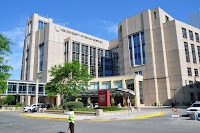Don't worry, I'll keep it short.
There are a bunch of different kinds of epilepsy, and a bunch of different kinds of seizures. The one most people think of, where you fall down and go into convulsions? Yeah, 40% of people with epilepsy (aka a
seizure disorder) don't experience that at all. A bystander might not even be able to tell that someone is having a seizure.
So what kind of seizures do I have? As you might guess from
my "Being Alone" post, I do have that big, scary kind of seizure—and it is scary. Historically, this has been called a
grand mal seizure (it's French for "big illness"). That doesn't really describe a lot about it, though, so in modern terminology people call it a
generalized tonic-clonic seizure. "Generalized" just means it involves the whole brain, and "tonic" and "clonic" (which has the same "o" sound as in "clone") describe the tightening and jerking muscle movements of a convulsion.
But wait, that's not all!
 |
| They don't all look like this. |
There are also
partial seizures, which involve only part of the brain (duh). These can be
simple partial seizures, where you're completely conscious and aware of what's going on, or
complex partial seizures, where consciousness is "impaired" (which is a polite way of saying that something is happening to you and you're not even aware of it). I'd be totally spooked if that happened to me.
My particular kind of seizures are called
partial-onset seizures. So what happens is I start by having a simple partial seizure, with the uncontrollable left-hand and left-arm twitching I mentioned in
my very first post. There's also a truly miserable feeling I've never been able to quite describe; it's kind of a mixture of falling, paralysis, dizziness, and lightheadedness. If that seizure lasts long enough, then I will have a generalized seizure on top of that, as the crazy activity on the right-hand side of my brain spreads throughout the whole brain.
There are a lot more different kinds of seizures as well—absence seizures, myoclonic seizures, atonic seizures (aka
drop attacks), and more. I may go into that later, but for now I wanted to give you guys the tools to describe what's happening to me. And a lot of other people as well. Having the right words for something is always the first step on the way to being able to work with it; so now you know!



